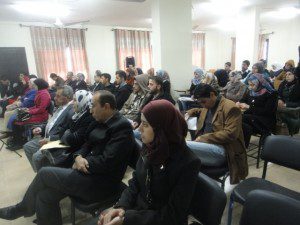Melissa Diamond and the rest of the team are still in Jenin, in the West Bank of the Palestinian territory for the next few months working on “The Jenin Autism Project,” part of “A Global Voice for Autism.” They are there to help parents learn about autism and Applied Behavior Analysis and help connect them to other autism resources as well as building their own supportive network. They are blogging their experiences here to share their efforts in figuring out how to best help children with autism in a part of the world where so little help is available. See the end of this post for links to prior posts on “The Jenin Autism Project.”

By Melissa Diamond
We were invited to give a lecture at Al Quds Open University, an excellent start to our community autism awareness initiative. When we arrived at the university, we had no idea how many people to expect at the lecture. One of our friends told us that there would likely be few people at first but that more would come in while we were talking. However, we walked into a room that was mostly full, and continued to fill as we set up our powerpoint. Even the Palestinian Broadcasting Corporation was there to film our lecture.
The presentation focused on signs and symptoms of autism, what to do if someone displays these symptoms and challenges that individuals with autism can experience. We emphasized the importance of seeking a diagnosis from a medical doctor as many community members have asked us whether therapists or teachers can diagnose. And, we made sure to note that autism is not the result of bad parenting, which is still a fairly common belief here.
Many in the audience were students studying education and social work and we hope that we succeeded in convincing them that all children are capable of learning and that while every child with autism is different, they all can make progress if given the opportunity.
After the lecture, there were so many questions that we did not have the chance to answer them all. Questions involved everything from the link between stress and autism, to whether autism is a sickness or a disability, to whether playing only one video game is harmful to a child with autism. We invited those who did not have the chance to ask their questions to stop by the center at any time for further discussions with us and access to new resources.
One woman at the lecture was a mother who plans to begin our program with her child in March. Another student came up to me after and told me that she has a 4-year-old brother with autism. She was not previously aware of opportunities for him, but she plans to bring him to the center on Saturday to learn more about our program. We are excited to be able to reach more families who can benefit from our program in Jenin.
Later, we met as a team and planned for an upcoming skills session. We will work with the mothers in two small groups (10-12 and 1-3) and will have them model ABA skills with one another. They will take turns pretending to be a child and will go over manding, tacting, intraverbals, prompting and fading prompts, and reinforcement. We hope that the session will be beneficial to the mothers as they fine-tune their work with their children. We will also schedule community outings for the children who have not yet had one.
Melissa is blogging about her team’s experiences, which will be posted here and on their own blog. For more information, please check their blog and the website for A Global Voice for Autism.












